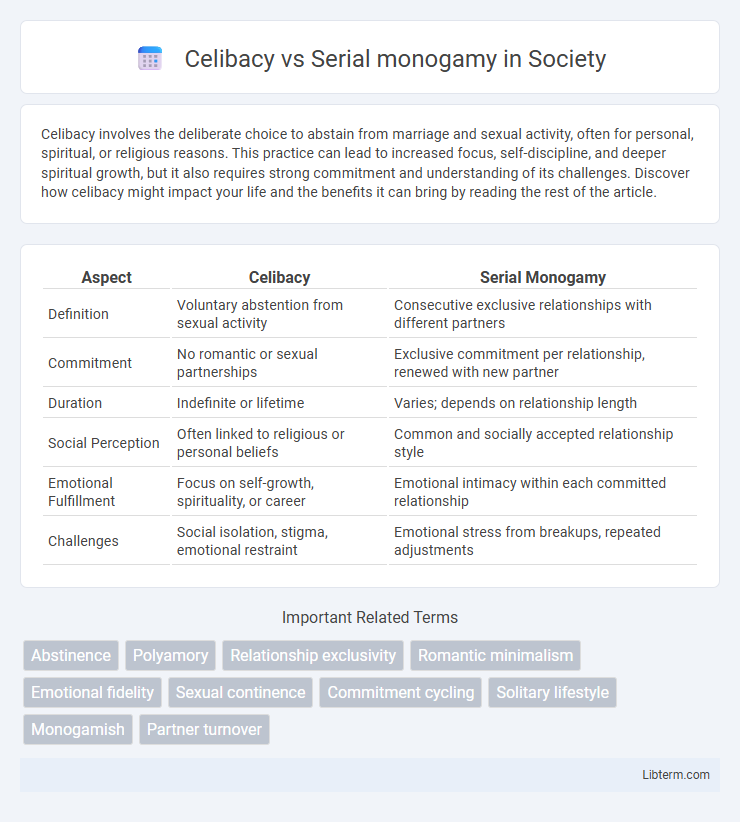Celibacy involves the deliberate choice to abstain from marriage and sexual activity, often for personal, spiritual, or religious reasons. This practice can lead to increased focus, self-discipline, and deeper spiritual growth, but it also requires strong commitment and understanding of its challenges. Discover how celibacy might impact your life and the benefits it can bring by reading the rest of the article.
Table of Comparison
| Aspect | Celibacy | Serial Monogamy |
|---|---|---|
| Definition | Voluntary abstention from sexual activity | Consecutive exclusive relationships with different partners |
| Commitment | No romantic or sexual partnerships | Exclusive commitment per relationship, renewed with new partner |
| Duration | Indefinite or lifetime | Varies; depends on relationship length |
| Social Perception | Often linked to religious or personal beliefs | Common and socially accepted relationship style |
| Emotional Fulfillment | Focus on self-growth, spirituality, or career | Emotional intimacy within each committed relationship |
| Challenges | Social isolation, stigma, emotional restraint | Emotional stress from breakups, repeated adjustments |
Understanding Celibacy: Definition and Purpose
Celibacy refers to the voluntary abstention from all sexual activity, often practiced for religious, spiritual, or personal reasons, symbolizing dedication and self-discipline. Unlike serial monogamy, which involves forming consecutive exclusive romantic relationships, celibacy emphasizes a deliberate choice to forgo intimate partnerships to achieve specific goals such as spiritual growth or emotional clarity. Understanding celibacy's definition and purpose highlights its role in fostering inner focus and long-term commitment to personal or theological ideals.
Serial Monogamy Explained
Serial monogamy refers to engaging in consecutive monogamous relationships where an individual commits to one partner at a time but has multiple partners over a lifetime. This pattern contrasts with celibacy, which involves abstaining from sexual relationships altogether. Studies indicate serial monogamy allows for emotional bonding and stability within each relationship while accommodating changes in personal circumstances and relationship dynamics.
Historical Perspectives on Relationships
Historically, celibacy has been predominantly practiced within religious and spiritual contexts, symbolizing devotion and self-discipline throughout ancient civilizations and major world religions. Serial monogamy emerged more prominently in Western societies with shifting social norms, reflecting changing attitudes towards marriage, divorce, and individual freedom from the 18th century onward. Both relationship models illustrate evolving cultural values and societal structures regarding commitment, sexuality, and personal identity over time.
Psychological Impacts of Celibacy
Celibacy often leads to increased self-awareness and emotional regulation due to prolonged periods of introspection and reduced external relational distractions. Psychological impacts include potential feelings of isolation or loneliness, which can contribute to anxiety or depression if not managed with supportive social networks. In contrast to serial monogamy, celibacy may foster deeper personal growth but also requires strong coping mechanisms to mitigate emotional challenges associated with abstaining from intimate relationships.
Emotional Dynamics in Serial Monogamy
Emotional dynamics in serial monogamy often involve repeated cycles of attachment, detachment, and reattachment, leading to fluctuating emotional stability and growth opportunities with each relationship. This pattern contrasts with celibacy, where emotional energy is typically channeled inward or into non-romantic pursuits, fostering different psychological outcomes such as heightened self-awareness and emotional regulation. Understanding the emotional complexities in serial monogamy highlights the challenges of balancing intimacy needs with the potential for emotional resilience or vulnerability.
Societal Attitudes and Cultural Influences
Societal attitudes toward celibacy often reflect religious or spiritual values that emphasize self-discipline and moral purity, commonly found in cultures with strong religious traditions such as Buddhism, Christianity, and Hinduism. Serial monogamy, prevalent in Western societies, is shaped by cultural norms that prioritize romantic love and personal fulfillment through sequential committed relationships, often influenced by shifting social dynamics and evolving views on marriage. These contrasting perspectives reveal how cultural influences mold acceptance and practice, with celibacy sometimes viewed as an esteemed sacrifice, while serial monogamy is seen as a pragmatic approach to companionship and family formation.
Health Considerations: Celibacy vs Serial Monogamy
Celibacy can offer health benefits such as reduced risk of sexually transmitted infections (STIs) and decreased emotional stress associated with relationship changes, promoting mental clarity and hormonal balance. Serial monogamy, while associated with increased exposure to STIs compared to celibacy, may provide emotional fulfillment and social support that contribute positively to mental health and overall wellbeing. Research indicates that both celibacy and serial monogamy involve distinct health trade-offs, highlighting the importance of safe practices and psychological care in either lifestyle choice.
Relationship Satisfaction and Fulfillment
Relationship satisfaction and fulfillment often vary significantly between celibacy and serial monogamy, as celibacy emphasizes personal growth and emotional independence without sexual engagement, while serial monogamy involves successive exclusive partnerships that provide diverse interpersonal experiences. Studies reveal that individuals practicing serial monogamy report higher levels of relational satisfaction due to continuous emotional intimacy and companionship, whereas celibate individuals may achieve fulfillment through self-reflection and spiritual or intellectual pursuits. Psychological research highlights that fulfillment in either lifestyle depends on personal values, attachment styles, and the alignment between expectations and lived experiences.
Challenges and Misconceptions
Celibacy faces challenges such as social stigma and internal struggles with sexual desire, while serial monogamy often grapples with commitment issues and emotional burnout. Misconceptions about celibacy include the belief it equates to loneliness or repression, whereas serial monogamy is mistakenly seen as instability or a lack of relationship skills. Both choices demand a nuanced understanding of personal values and emotional health to navigate societal pressures effectively.
Choosing What Fits: Personal Values and Lifestyle
Choosing between celibacy and serial monogamy hinges on aligning relationship choices with personal values and lifestyle preferences. Celibacy suits individuals prioritizing spiritual growth, self-discipline, or avoiding emotional complexities, while serial monogamy fits those valuing romantic experiences and adaptability in long-term partnerships. Understanding one's emotional needs, cultural background, and life goals promotes a fulfilling approach to intimacy and commitment.
Celibacy Infographic

 libterm.com
libterm.com